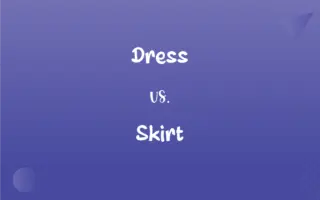Comedian vs. Comedienne: What's the Difference?
Edited by Aimie Carlson || By Janet White || Updated on September 27, 2023
A comedian is a person who performs comedy, regardless of gender, while a comedienne specifically refers to a female comedian.

Key Differences
The term "comedian" and "comedienne" both belong to the realm of entertainment, especially in the context of performance arts. A comedian can be used to denote any individual, irrespective of their gender, who engages in the craft of comedy. On the flip side, "comedienne" is a term that highlights the female gender, pinpointing a woman who makes her living or passion out of making people laugh.
While "comedian" remains gender-neutral in its usage, the need for the term "comedienne" arose from the desire to give female performers their distinct identity in the comedy sector. It serves a purpose similar to "actor" and "actress," where the latter has traditionally indicated female professionals.
However, the contemporary world of comedy sees a shift. Many female comics prefer the title "comedian" over "comedienne," considering it a more inclusive term and wanting to emphasize their skills over their gender. The usage of "comedienne" has seen a decline, with "comedian" becoming the more universally accepted term.
In linguistic terms, the suffix "-enne" in "comedienne" is of French origin and has been used to feminize certain English words. Still, as society moves towards gender-neutrality in language, distinctions like "comedian" and "comedienne" might become less prevalent.
Comparison Chart
Gender Association
Gender-neutral.
Specifically female.
ADVERTISEMENT
Origins
From Latin "comēdia".
French suffix "-enne" added to comedian.
Contemporary Usage
Commonly used for all genders.
Less prevalent, often replaced by "comedian".
Linguistic Role
Standard noun.
Feminized noun.
Profession Identity
Focuses on profession.
Emphasizes both profession and gender.
Comedian and Comedienne Definitions
Comedian
A person who entertains through comedy.
The comedian had the whole audience laughing.
ADVERTISEMENT
Comedienne
A female who writes comedic material.
The comedienne crafted her skits with wit.
Comedian
An actor specializing in comedic roles.
The comedian played the lead in the rom-com.
Comedienne
A woman known for being humorous in life.
Lucy is the comedienne among her friends.
Comedian
A presenter known for their comedic style.
The comedian hosted the award show brilliantly.
Comedienne
An actress excelling in comedic roles.
The comedienne was nominated for her performance.
Comedian
Someone known for being humorous in everyday life.
Jake is the comedian of our group.
Comedienne
A female presenter with a comedic style.
The comedienne kept the audience engaged throughout.
Comedian
A person who pens comedic material.
As a comedian, he writes his own jokes.
Comedienne
A female who entertains through comedy.
The comedienne received a standing ovation.
Comedian
A professional entertainer who tells jokes or performs various other comic acts.
Comedienne
A woman professional entertainer who tells jokes or performs various other comic acts.
Comedian
An actor in comedy.
Comedienne
(dated) A female comedian.
Comedian
A writer of comedy.
Comedienne
A women who plays in comedy.
Comedian
A person who amuses or tries to be amusing; a clown.
Comedienne
A female actor in a comedy
Comedian
An entertainer who performs in a humorous manner, especially by telling jokes.
Comedienne
A female comedian
Comedian
(by extension) Any person who is humorous or amusing, either characteristically or on a particular occasion.
Comedian
(dated) A person who performs in theatrical plays.
Comedian
(obsolete) A writer of comedies.
Comedian
An actor or player in comedy.
Comedian
A writer of comedy.
Comedian
A professional performer who tells jokes and performs comical acts
Comedian
An actor in a comedy
FAQs
Is the "-enne" suffix common in English?
It's of French origin and used to feminize some English words, but it's not common.
Why do some female comics prefer "comedian"?
Many consider it inclusive and want to emphasize skill over gender.
Do male comedians ever use "comedienne"?
No, "comedienne" specifically refers to female comedians.
Do comediennes write their own material?
Many do, just as many comedians write their own jokes.
Is "comedienne" an outdated term?
While not completely outdated, its usage is less common today.
Why was "comedienne" used historically?
It was to give female comedians a distinct identity in comedy.
How has comedy evolved for women over the years?
Women have gained significant recognition and representation in comedy.
Can "comedian" refer to both men and women?
Yes, "comedian" is a gender-neutral term.
Is there a difference in roles for comedians and comediennes?
No, the distinction is gender-based, not role-based.
Is stand-up comedy different for comedians and comediennes?
The approach might differ based on individual experiences, but comedy is universal.
Are there comedienne-only comedy shows?
Yes, some shows or events feature exclusively female comedians.
Are "comedian" and "actor" similar in usage?
Yes, both terms have become more gender-neutral over time.
Are there awards distinguishing comedians from comediennes?
Some awards ceremonies might, but many now use gender-neutral categories.
How do comedians and comediennes train?
Many attend comedy schools, workshops, or perform stand-up.
Is "comedienne" used in non-English languages?
The usage varies, but languages like French have gender-specific terms.
About Author
Written by
Janet WhiteJanet White has been an esteemed writer and blogger for Difference Wiki. Holding a Master's degree in Science and Medical Journalism from the prestigious Boston University, she has consistently demonstrated her expertise and passion for her field. When she's not immersed in her work, Janet relishes her time exercising, delving into a good book, and cherishing moments with friends and family.
Edited by
Aimie CarlsonAimie Carlson, holding a master's degree in English literature, is a fervent English language enthusiast. She lends her writing talents to Difference Wiki, a prominent website that specializes in comparisons, offering readers insightful analyses that both captivate and inform.






































































